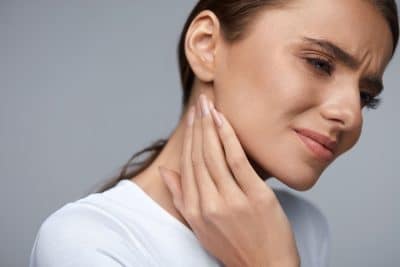 TMJ Symptoms
TMJ Symptoms
Symptoms related to jaw dysfunction and bruxism will occur in the head, face, ears, neck, upper back, and lower extremities.
More About Bruxism
Bruxism can lead to TMJ, and TMJ can lead to bruxism. These two are often linked because when the TMJs are not functioning correctly, your overworked jaw joints will cause you to clench and grind your teeth. In the same way, clenching and grinding your teeth places wear and tear on your bite; that wear and tear manifests itself with the other symptoms of TMJ, like jaw pain and clicking noises in the jaw joint area.
Untreated TMJ usually gets worse, and severe bruxism will likely change your bite over time. Excessive grinding and clenching can gradually push your teeth out of their proper position, and bruxism can also cause damage to your teeth and dental restorations. These problems result in a misaligned bite that will eventually cause pain.
If your upper and lower teeth do not close together properly, your muscles may reposition the temporomandibular joints out of their sockets to force your teeth together. For all of these reasons, it’s imperative to seek TMJ treatment at the first signs of bruxism or any of the other symptoms of TMJ.
Your partner will often hear you grinding your teeth at night, and you may even notice you clenching your teeth while driving or sitting at your desk.
TMJ and Bruxism Treatment
Advances in TMJ diagnosis and treatment allow TMJ dentists like Dr. Mejia to provide relief rather quickly to those of you suffering from TMJ and bruxism. Once we have gathered information about your specific problem areas using the most advanced TMJ technology, Dr. Mejia and her TMJ treatment team will offer you TMJ treatment options.
You may benefit from Phase I and Phase II treatment depending on the severity of your condition:
- TENS (Transcutaneous Electric Nerve Stimulation)
- Change in pillow or mattress
- Change in position
- Lifestyle changes like avoiding alcohol and caffeine in the late afternoon and early evening
- Exercise therapy for your jaw joints
- Oral appliance to move your jaw into its optimal position
- Orthodontic treatment
- Dental restorations
Dr. Mejia will know the best course of treatment for you once she performs a thorough evaluation and gathers your medical history. You will be asked questions about your habits at home and work, life stressors and prior TMJ treatment, if any.
Learn More About TMJ Treatment and Bruxism in Westchester, NY
Please call Dr. Wanda Mejia at (914) 594-6854 to schedule a bruxism/TMJ evaluation, or you may fill out our online contact form. One of our team members will contact you soon to answer any questions you may have or assist with scheduling.
